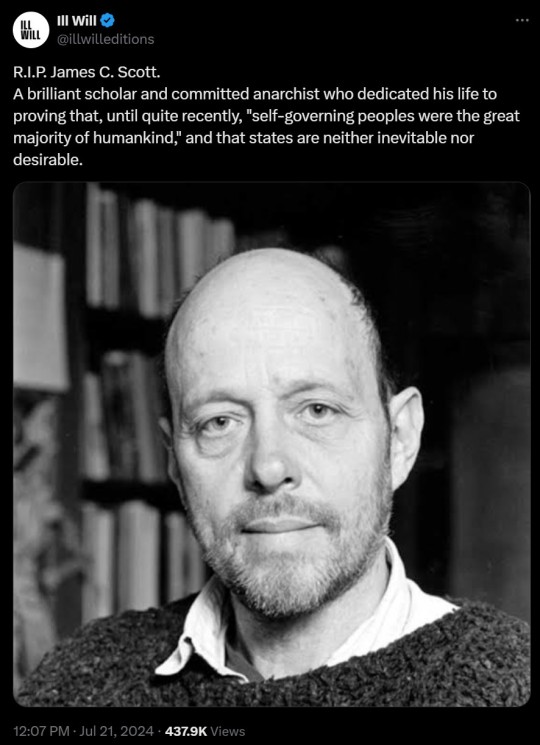#james c scott
Explore tagged Tumblr posts
Text

James C. Scott may or may not have been a CIA informant in the early 1960s, but made up for it, sort of, by his contributions to anarchist theory--unless you are an Indonesian communist...and then you're probably still pissed at him even though he's just about as dead as those comrades of yours he informed on (according to some) who were later killed in Sukarno's massacres of the PKI and similar groups (according to everyone--read The Jakarta Method and The Devil's Chessboard if you want more information on this bloodsoaked chapter (all of them are, just comes from different places at different times) of the Company's history) .
I'll admit to a fondness for Seeing Like a State and The Art of Not Being Governed.
#james c scott#anarchism#resistance#cia informants#reading list#the jakarta method#cold war#bash the fash#a fascist worked out today--have you?#antifascist
22 notes
·
View notes
Text

omg even James C Scott's wiki page mentions his CIA connections and his history as anti communist organiser.
21 notes
·
View notes
Text
Technocracy is so funny because it's just like, "You know those physics/engineering major types who don't actually understand your field but are convinced that they do and that you're getting it wrong? Yeah, well they're in charge now. Yeah, they seem to think that your farm should be run like an assembly line, you know; neat rows, rote processes, Taylorist management...Yeah, they think that your claims that it won't work are just because you're a superstitious peasant. Anyways, best get picking." And then there's a famine.
84 notes
·
View notes
Text
James C. Scott has died.
I would like to take a second to celebrate him. His works on anthropology and political theory did so much to illuminate the operations of Power, of Domination, of the State.
Important wisdoms that are tied into my soul came from his writing. Whatever path we take, we carry him with us. When we speak, his voice will be in the chorus. His flaws will be our prompts to right action; his right action will be an example to ground ourselves in.
We continue The Work, in your name, and in the name of those who came before, and established the lineage we are both a part of.
Long live Anarchy.

7 notes
·
View notes
Text

"The sort of lawbreaking going on here is, I think, a special subspecies of collective action. It is not often recognized as such, in large part because it makes no open claims of this kind and because it is almost always self-serving at the same time. Who is to say whether the poaching hunter is more interested in a warm fire and rabbit stew than in contesting the claim of the aristocracy to the wood and the game he has just taken? It is most certainly not in his interest to help the historian with a public account of his motives. The success of his claim to wood and game lies in keeping his acts and motives shrouded. And yet, the long-run success of this lawbreaking depends on the complicity of his friends and neighbors who may believe in his and their right to forest products and may themselves poach and, in any case, will not bear witness against him or turn him in to the authorities.
One need not have an actual conspiracy to achieve the practical effects of a conspiracy. More regimes have been brought, piecemeal, to their knees by what was once called “Irish democracy,” the silent, dogged resistance, withdrawal, and truculence of millions of ordinary people, than by revolutionary vanguards or rioting mobs."
-- James C. Scott, Two Cheers for Anarchism
3 notes
·
View notes
Text
"As the biologist J. B. S. Haldane metaphorically described the advantages of smallness: 'You can drop a mouse down a thousand yard mineshaft; and on arriving at the bottom, it gets a slight shock and walks away. A rat is killed, a man broken, a horse splashes.'”
James C. Scott, Seeing Like a State: How Certain Schemes to Improve the Human Condition Have Failed, 1998.
0 notes
Text

James C. Scott, Two Cheers for Anarchism: Six Easy Pieces on Autonomy, Dignity, and Meaningful Work and Play, (Princeton University Press, 2009). translated in Japanese, 2017.
1 note
·
View note
Text
Rest in piece James C Scott, you were a real one
0 notes
Text
The Origins of Modern Bureaucracy | 2414
Where did modern bureaucracy come from? Colonel Sylvanus Thayer, the Father of the Military Academy, or the ‘man who made West Point
#education#grammatocentric principle#history#james c scott#jay springett#Jefferson#learning#neil postman#paris#permanently moved#podcast#railway#seeing like a state#Sylvanus Thayer#system#techno social#thejaymo#Total Institution#Westpoint Military#world
1 note
·
View note
Text






12 notes
·
View notes
Text
a frustrating thing about battle royale stories is that they take place in a world where there's a massive popular appetite to see torture and death, the existence of this appetite is the main moral evil of the story (so far so fine), and the author tends to pretend this is also a huge problem in our world so that their work can stand as a Commentary On Real Evil. when the world their actual readership lives in has the opposite problem – too squeamish about seeing torture and death and coercion and collectively agrees to sequester it out of view so that nice things can keep being available for under five dollars at the grocery store
#rambl#i did it! i put a 5 paragraph essay in drafts and boiled it down into 1 paragraph on my second try!#anyway. i followed up the gorey litrpg series with a nonfiction book by a james c scott student who worked at slaughterhouses#and man did that book help immediately crystallize my vague moral discomfort with the litrpg series.#I love fictional gore and torture. I *do not love* real life gore and torture. that the latter preference is widely shared is evident#in how hard the meat industry tries to abstract it out of view & make filming illegal & hide the killing *even from slaughterhouse workers*#(it's divided up so people have minimal visibility/responsibility)#imo this is not a feature of our moral universe you should ignore or signflip if you want to write about good and evil and capitalism!
393 notes
·
View notes
Text

Someone whose work I greatly appreciated and would suggest you (oh dear reader) seek out and read. In simplest terms, Scott explored the avenues in which people resisted and evaded authority and hierarchical systems of control. A good part of his scholarship involved trying to understand peasantry, one the largest "classes" in the world. Coupled to that was the study of subsistence economies and how people involved in those economies work around impositions made by State actors (and non-state actors). This led to a larger exploration of the above mentioned resistance and the various forms that this resistance took around the world. He also explored the relationship between State and non-state peoples. "What I learned is that centralised revolutionary movements have almost always resulted in a State that was more oppressive then the ones they aimed to replace. In other words, when the revolution becomes the State, it becomes my enemy again. That is why it matters greatly which methods are used in order to achieve power. .... "I am the enemy of hierarchical movements of opposition because I think they replicate State structures in their own organisation."
If you would like some suggestions that offer a peak into Scott's scholarship interests (which are similar to my own), here's some videos for you to peruse (if you have the time): 1. A Short Account of the Deep History of State Evasion 2. Beyond the Pale: The Earliest Agrarian States and “their Barbarians” 3. The Art of Not Being Governed 4. The Domestication of Fire, Animals, Grains and…….Us (Later) Edit: Some revelations concerning Scott's involvement with the CIA in the early 1960s in their anti-Communist activities has come out after his recent death that complicates his legacy as a "radical scholar". Take that for what you will. I haven't been able to find a great deal of detail about that involvement and the revelations here aren't exactly new but people have decided to highlight that relationship in the wake of Scott's passing as a way to discredit or cast a shadow over his later anti-statist research. I just wanted to note this. (Even Later) Edit: The Oral History Center at UC Berkeley released a documentary on Scott called In A Field All His Own: The Life and Career of James C. Scott. Just in case you wanted more Scott related material.
#James C. Scott#seeing like a state#the art of not being governed#anarchism#academia done right IMO#history#anthropology#social history
461 notes
·
View notes
Text
old buddies ❤️






214 notes
·
View notes
Text
"An astute colleague of mine once observed that liberal democracies in the West were generally run for the benefit of the top, say, 20 percent of the wealth and income distribution. The trick, he added, to keeping this scheme running smoothly has been to convince, especially at election time, the next 30 to 35 percent of the income distribution to fear the poorest half more than they envy the richest 20 percent. The relative success of this scheme can be judged by the persistence of income inequality—and its recent sharpening—over more than a half century. The times when this scheme comes undone are in crisis situations when popular anger overflows its normal channels and threatens the very parameters within which routine politics operates. The brutal fact of routine, institutionalized liberal democratic politics is that the interests of the poor are largely ignored until and unless a sudden and dire crisis catapults the poor into the streets. As Martin Luther King, Jr., noted, “a riot is the language of the unheard.” Large-scale disruption, riot, and spontaneous defiance have always been the most potent political recourse of the poor. Such activity is not without structure. It is structured by informal, self-organized, and transient networks of neighborhood, work, and family that lie outside the formal institutions of politics. This is structure alright, just not the kind amenable to institutionalized politics.
-- James C. Scott, Two Cheers for Anarchism
4 notes
·
View notes
Text












Dr. Strangelove or: How I Learned to Stop Worrying and Love the Bomb (1964)
#dr strangelove#dr strangelove or how i learned to stop worrying and love the bomb#dr strangelove 1964#stanley kubrick#peter sellers#george c scott#sterling hayden#keenan wynn#slim pickens#peter bull#james earl jones#1960s#1964#filmedit#film#cinema#movies
284 notes
·
View notes